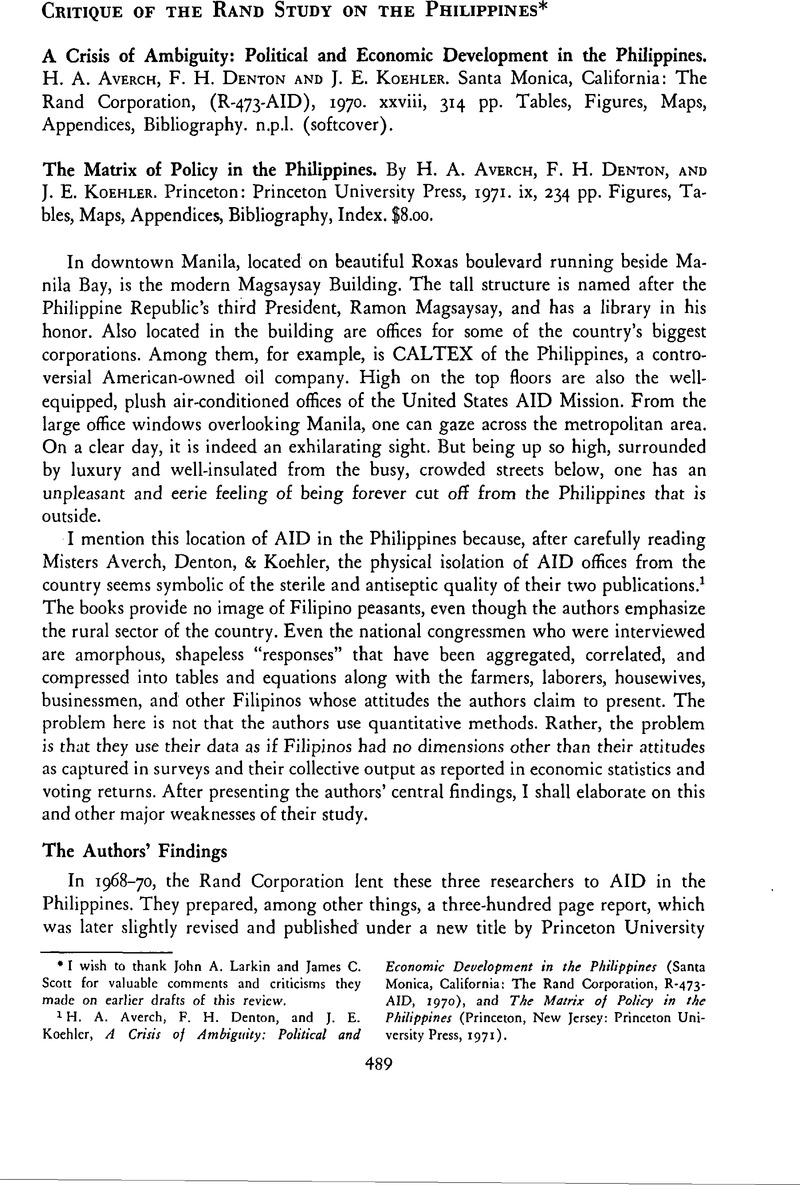No CrossRef data available.
Article contents
Critique of the Rand Study on the Philippines*
Published online by Cambridge University Press: 23 March 2011
Abstract

- Type
- Review Articles
- Information
- Copyright
- Copyright © Association for Asian Studies, Inc. 1973
References
lAverch, H. A., Denton, F. H., and Koehlcr, J., A Crisis of Ambiguity; Political Economic Development in the Philippines (Santa Monica, California: The Rand Corporation, R-473-AID, 1970), and The Matrix of Policy in the Philippines (Princeton, New Jersey: Princeton University Press, 1971).CrossRefGoogle Scholar
2 Notations in parentheses refer to the publication—“1970” is the original Rand report and “1971” is the edition from Princeton University Press. Page citations follow the date. In most cases here, I will only cite the 1971 book even though the earlier study usually has the same information.
3 Since this review was written three months prior to the September 1972 declaration of martial law in the Philippines, my assessment of the authors1 work has not been influenced by the recent events. The growing unrest does demonstrate even more clearly, however, how far of! base the authors were.
* Pegasus stands for Philippine rthnic group attitude surveys.
** IDLRS stands for International Data Library and Reference Service.
4 In their 1970 publication, the authors arc even more explicit on this point. Based on survey and electoral data, they conclude, “…contrary to popular belief, the poor were not discontented.” (1970: 104.)
5Lande, Carl, Structure of Philippine Politics: Leaders, Factions, and Parties (New Haven: South east Asia Studies, Yale University, 1965);Google ScholarHollnsteincr, Mary R.. The Dynamics of Power in a Philippine Municipality (Quezon City: University of the Philippines Community Development Research Council, 1963);Google ScholarLynch, Frank, Social Class in a Bik,ol Town (Chicago: Philippine Studies Program Research Series, University of Chicago, 1959);Google ScholarLewis, Henry T., Hocano Rice Farmers (Honolulu: University of Hawaii Press, 1971).Google Scholar
6Gamos, Benjamin, “Military Has Stock Tag for Gunmen—Huks” Manila Chronicle, 20 March 1972 p. 12. (Emphases are added.)Google Scholar
7 The term “moral indignation” is from Lupsha, Peter, “Explanations of Political Violence: Some Psychological Theories Versus Indignation,” Politics and Society, 2 (Fall 1971), 89–104.CrossRefGoogle ScholarFor the development of similar concepts, see Banfield, Edward C., The Unheavenly City (Boston: Little, Brown and Company, 1970),Google Scholar and Ructf, George F., The Crowd in History (New York; Wiley, 1964).Google Scholar
8Kerkvliet, Benedict J., “Peasant Rebellion in the Philippines: The Origins and Growth of the HMB,” (unpublished Ph.D. dissertation, University of Wisconsin, 1972).Google Scholar
9Carino, Ledivina V., “A Crisis of Reporting: A Critique of The Rand Report,” Philippine Journal of Public Administration, 14 (October, 1970) 354–77.Google Scholar
10 Lande, Structure of Philippine Politics. …
11Tilman, Robert O., “Student Unrest in Philippines: The View from the South,” Asian Survey, 10 (October 1970), 900–09.CrossRefGoogle Scholar
12Takahashi, Akira, Land and Peasants in Central Luzon (Tokyo: The Institute of Developing Economies, Occasional Papers, 1969).Google Scholar
13Tilman, , Asian Survey (October 1970), 907.Google Scholar




